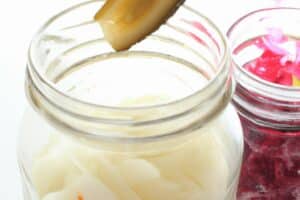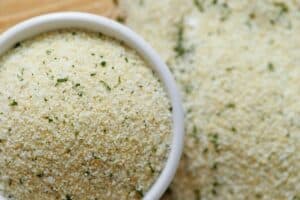Coriander is an internationally recognized aromatic spice used in all cuisines. It’s native to the Middle East and the Mediterranean regions and is part of the Parsley family. Coriander leaves are known as cilantro in some parts of the world, while they’re Chinese Parsley in other regions.
Also, some people either love it so much — they can’t eat a dish without it, while others find its taste too pronounced, they can’t stomach it. If you’re in the second category, here are five great coriander substitutes.
Recommended Coriander Substitutes
1. Caraway Seeds
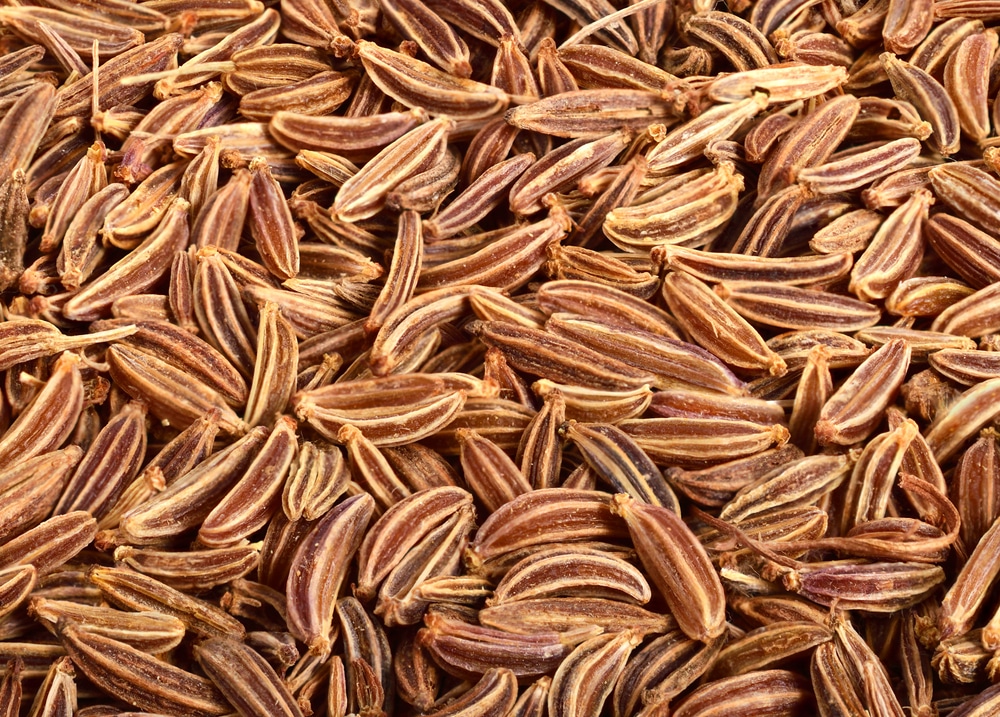
Since they are closely related, caraway seeds are among the top substitutes for coriander. They have a nutty, bittersweet flavor with hints of citrus and anise, almost similar to coriander, and a sharp, stimulating, peppery aroma similar to cumin.
Caraway seeds are rich in natural essential oils and pack a punch of antioxidants. As a result, they are perfect for culinary applications and medicinal purposes and have a wide range of health benefits. For instance, they’re rich in dietary fiber and aid digestion.
Although caraway seeds are the most popular part of the caraway plant, the whole plant can cook. The leaves can serve as an herb like Parsley, while the roots can be cooked as vegetables similar to carrots. Caraway seeds are commonly used in soups, rye and brown bread, stews, and even while making sausages.
How to Use Caraway Seeds as a Coriander Substitute
Caraway seeds are available as either whole seeds or as ground. Whole caraway seeds are an excellent option, but they tend to impart the seeds’ crunchy texture in your dish. That said, the best way to use caraway seeds as a coriander substitute is if they are ground.
However, note, ground caraway is more potent and should be substituted in a 1:1 ratio with coriander. If you don’t like coriander or want to break the monotony of using it but want an almost similar flavor, you can find both whole and ground caraway seeds in grocery stores.
See Also: Caraway Seed Substitute
2. Cumin
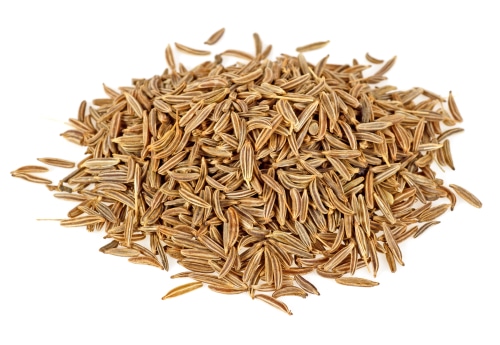
Cumin is one of the best coriander alternatives around. It is a spice native to ancient Egypt and the Middle East. In Egypt, cumin was used as a spice and as one of the ingredients used to preserve mummies.
It is made from the dried seeds of the Cuminum Cyminum and is part of the parsley family. Cumin seeds resemble caraway seeds but with different color variations. Common types of cumin include black, green, and white cumin.
Cumin typically contains about 7.88 calories, 0.37 proteins, 0.93g of carbs, and 0.47 fat. It also includes a high amount of calcium, iron, and magnesium. Since it’s rich in antioxidants and iron, the health benefits of cumin include reduced cholesterol, improved memory, reduced stress, and even helps with diabetes management.
How to substitute Coriander with Cumin
Like most coriander substitutes on our list, cumin is available as whole seeds or ground powder. Different cultures have different ways of using it. For instance, in Indian dishes, cumin is used as whole seeds, while in Mexican cultures, it’s used as ground cumin.
Since it’s part of the parsley family, cumin has a warm, smokey, nutty flavor that’s almost similar to coriander. To substitute coriander with cumin without ruining your dish, only add ¾ of it to whatever you’re cooking. Use black cumin for an even better taste, but add it slowly while stirring your dish for best results.
Can’t find cumin? See recommended cumin substitute.
3. Basil

Fresh coriander and ground coriander taste different. While the above options are great coriander replacements, basil is your go-to substitute for coriander if you’re looking to get that fresh coriander flavor.
Basil is among the oldest herbs known to man. It is part of the mint family and boasts a plethora of healing and health benefits which is why it’s commonly used in spiritual rituals. For instance, In Hinduism, basil is said to be a symbol of Goddess Vrinda. As a result, millions of Hindus globally use the plant as part of their worship.
Basil is rich in antioxidants and is widely used to reduce oxidative stress, significantly improving the user’s overall wellbeing. Other health benefits of basil include;
- Supports liver health
- Protects against aging
- Facilitates better digestion
- Reduces high blood sugar
- Promotes cardiovascular health
How to Use Basil as Coriander Substitution
Fresh basil is not as potent as ground basil, especially if you use it straight from your garden. For that reason, you can use it in your pasta, drizzle it over salads, add it to your sandwiches or garnish food with it to your satisfaction. Thanks to its bright, minty, nutty flavor that’s almost similar to coriander, basil pairs well with Asian and Italian cuisines.
4. Curry Powder
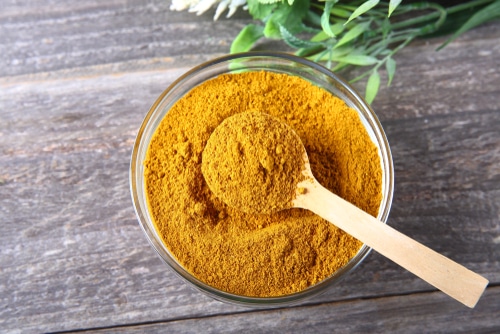
Similar to caraway seeds, curry powder is also a spice staple in most spice dishes. It is especially popular in Indian and Asian dishes and is characterized by its rich orange hue. Curry powder is a turmeric-based spice blend with cumin, ginger, and coriander as its other main ingredients.
Note that curry powder ingredients vary from one place to another, and you may find some containing chili powder and ground cumin. Some cultures even add ground lime leaves for an intense tangy taste. Generally, it has a spicy flavor and is especially perfect for soups and dish marinades.
Similar to most of the coriander alternatives on our list, curry powder also has extensive health benefits. For instance, it has been proven to reduce inflammation, boost bone health, and even combat Alzheimer’s disease.
Substituting Coriander with Curry Powder
Since it contains coriander, curry powder is an excellent coriander substitute if you’re working towards a not-so-overpowering coriander flavor. While substituting it for coriander, keep in mind it’s a blend of multiple spices, and a little goes a very long way. Due to the presence of turmeric, curry powder also imparts a strong orange color to your dishes, making them look even more delicious.
5. Garam Masala
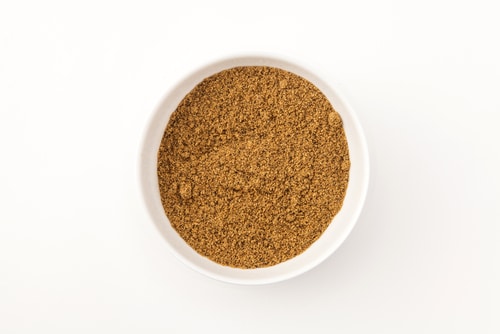
If you are looking for a blended spice to use as a substitute for coriander but don’t want turmeric in your dish, garam masala is an excellent alternative. It is a widely used spice blend in Indian cuisines.
The name garam masala means “warming spice.” That means most if not all of its ingredients help speed up metabolism and warm the body. Depending on the brand you use, this spice may contain ground coriander seeds, peppercorns, cumin, mace, cinnamon, and cardamom pods.
Although there’s no single garam masala recipe, the spice blend has its roots in Northern India, where the super cold winters called for foods and beverages with metabolism-boosting properties. The primary difference between garam masala and curry powder is that the former does not contain turmeric.
Cooking with Garam Masala instead of Coriander
Garam masala has a warm, sweet taste with floral notes and hints of black pepper. In some regions like Northern India, garam masala is mild and aromatic. In other areas such as Southern India, it’s hotter. Some variations of garam masala often boast a sweety, tangy flavor due to ingredients like coriander and cardamom.
Since it’s a blend of different spices, garam masala is best used in small amounts, especially if you’re substituting it for coriander.
Gradually add small amounts as you stir until it gets that fantastic coriander taste with hints of other spice ingredients it contains. Use it as a final seasoning for best results, adding it to your dish when it’s almost ready.
You can find garam masala for coriander substitution in the spice section of any well-stocked grocery store or supermarket. However, for legit-tasting garam masala, consider shopping from Indian grocery shops. This blended spice is best paired with dishes such as chicken tikka and butter chicken.
Other Great Coriander Alternatives
Besides the five spices highlighted above, the following also make superb coriander replacement:
- Dill
- Chervil
- Fennel seeds
- Parsley
- Oregano
- Lovage
- Cilantro leaves
- Sage
- Celery
- Eryngium foetidum
Happy Coriander-free Cooking
Coriander is one of the most versatile aromatic spices around. It has a long string of health benefits, including lowering blood sugar levels, improving heart health, aiding digestion, and boosting the immune.
However, not everyone is a fan. Even those who are fans may at times be irritated by its overpowering taste. Luckily, you don’t have to give it up altogether because, as shown above, there are plenty of spices you can substitute for coriander.
The flavor won’t be precisely the same, but each of the coriander substitutes above will provide a unique, distinctive flavor, nearly similar to coriander but not as intense. With that said, have a happy coriander-free cooking experience.



